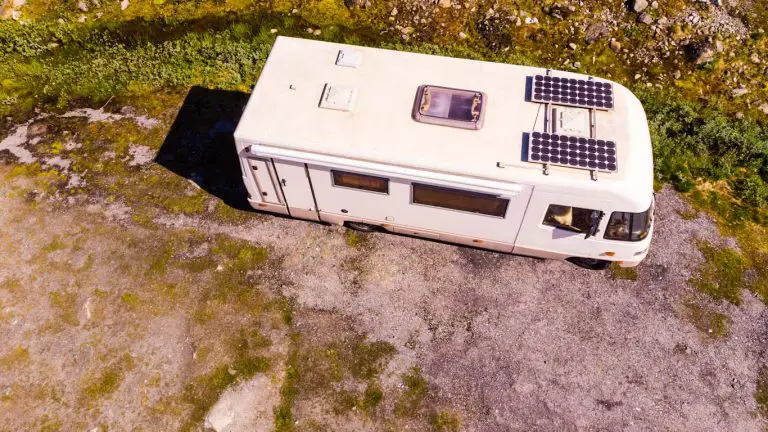How Does A Solar Fridge Work?
Solar panels produce electricity from collected solar radiation. They can be wired to run a refrigerator directly, or as part of a larger setup. If you want to keep the appliance running at night, you’ll need a setup including batteries. You can power both portable and home refrigerators with solar.
Among the many things that solar energy can power are refrigerators. It is good news for those that like the outdoor life but want at least some of the comforts of home.
This article explains how a solar fridge works and the required setup.
How Does A Solar Refrigerator Work?
A solar refrigerator is a common fridge (high efficiency) that can be powered by solar energy through solar panels or other means to harvest the sun. Solar refrigerators have special features too.
Solar refrigerators tend to be compact and smaller than typical house refrigerators to ensure they can last as long as possible with the electricity provided by solar panels, no matter the weather.
They are built taking into account those days when the solar panels run at lower efficiency due to clouds or other reasons. For this reason, some solar fridges might have special insulation or other features designed to keep the cold air inside and use less electricity.
Most solar-powered refrigerators work similarly to the traditional ones, which means they have an electric compressor responsible for increasing the pressure on the refrigerant, which is pushed to flow on the outside coils of the fridge.
The refrigerant converts into a liquid and flows back into the fridge, and at this point, it can absorb the heat from the fridge, thus lowering the temperature. Solar refrigerators are built similarly but are better insulated and have other energy-saving features.
What Makes A Solar Refrigerator Different From Traditional Fridges?
Solar refrigerators have features that differentiate them from traditional fridges because they are often used outdoors and where there is no other source of electricity than the sun.
Here are some of the things that are different in solar refrigerators:
- They are generally an excellent option for 1 or 2 people
- It can work as a freeze or a fridge
- Can have removable wire baskets
- Can run with AC or DC power, while some models run with both
- They have a thick insulation
- Temperature management that reduces energy consumption, sometimes even by 50%
- LED control panel
- Some models have an auto defrost feature
- Chest design that prevents cold air from going out once the lid is opened
- They are smaller
- They are highly adjustable
Solar refrigerators are generally designed to operate on 12-volt power, which is compatible with solar panels.
You can expect a good quality solar fridge to be highly efficient and suitably insulated to ensure they consume less and maintain the lower temperature for a more extended period.
The higher efficiency, the lower the number of times the compressor has to kick on, resulting in lower consumption.
In chest-designed solar fridges, warm air rises while cold air stays at the bottom, which is way different from a regular fridge. When you open your refrigerator door, cold air tends to go out immediately.
How To Choose A Solar Refrigerator?
If you are looking to get a solar refrigerator, there are some key things to look into. Here are some of the primary considerations:
Price
The primary consideration for most people is the price tag. Solar refrigerators can be way more expensive than you think; they are exceptionally high-quality products with many features.
Some models can cost as much as home refrigerators.
But fortunately, it is possible to find cheaper solutions, although you might have to give up some features. Depending on your needs, you should decide what the best solution for you is.
For example, if you use a solar fridge outdoors and have a small budget, a product that can do the job without the fancy LED system or internal lights could be enough.
Some people might also want to use a solar fridge in their house as part of going entirely off the grid. In this case, they have a solar system that powers the entire home. Spending more money to get a quality fridge can be beneficial for a more extended period due to lower energy consumption and durability.
Solar Refrigerant Size
The size is an essential factor for a solar refrigerator. In addition, you should look for the internal storage space, which tells you how much food you can store, and the exterior size, which will tell you if you can fit it in your car, RV, or storage.
Once you find the dimensions available for your solar fridge, you can find the model that best suits you.
Start-Up Power Usage And Power Consumption
Solar panels can produce only a certain amount of electricity; therefore, before purchasing a solar refrigerator, it is essential to figure out its power consumption and how many solar panels you need.
It is necessary to figure out how much the hourly energy consumption is and the wattage required when the refrigerator is turned on. At the moment of start-up, a refrigerator draws 3 to 6 times the energy a refrigerator generally needs.
To start up, a refrigerator requires only a few seconds, but they need this much electricity during those seconds. If you do not work this out, you might not be able to turn on your solar refrigerator.
Verify that your solar kit is strong enough to handle the power surge without tripping a breaker or developing other issues.
Do You Require Only A Refrigerator Or Also A Freezer?
It is possible to find solar refrigerators that are divided into two different zones, one for the fridge and the other for the freezer. Dual zones solar refrigerators consume more than a single zone product.
Single-zone refrigerators are more efficient and are also cheaper.
Insulation
Insulation is an essential factor to verify when purchasing a solar refrigerator. A poorly insulated fridge is less efficient and will consume more. The insulation prevents the exchange of cold air with the outside hot air.
The thicker the insulation, the more energy efficiency you can expect the solar refrigerator to be. The materials commonly used to provide insulation are:
- Fiberglass
- Polyurethane rigid foam,
- Extruded polystyrene
Each material used to insulate a solar fridge has different properties and qualities. It is better to ask which type of insulation is used and determine the advantages and disadvantages before deciding.
Types Of Storage
Depending on your needs, the type of storage can be a crucial factor when you want to choose the best solar fridge. Although the options are endless, you can find refrigerators with trays, drawers, wire racks, compartments, etc.
If you select a solar refrigerator with removable shelves or racks, you can create more space depending on the amount of food you store.
Efficiency
Although solar refrigerators are built to be energy efficient, there are other things you can look at to improve efficiency.
For example, you should choose a solar refrigerator with energy consumption below 360 KWh and above 250KWh; in this way, you have enough wattage for cooling without consuming too much.
In addition, if you are unsure which solar fridge is good for you, you can read online reviews to see what other customers say.
How Much Power Does A Solar Fridge Use?
Each solar fridge model might have different power consumption; however, domestic fridges could consume between 250 and 780 watts, while a typical mini fridge could consume between 50 and 100 watts.
Different factors can modify energy consumption, for example, the model, size, age, and even the outside temperature.
If you want to figure out the running watts of your solar refrigerator, you can do it by using the Amps and the Volts, usually listed on the electrical fridge label.
The formula is the following: Amps x Volts = Watts
This way, you can figure out the running watts but not the starting watts, which can be up to 6 times the number you figured out above. So it is better to ask the producers in case of any doubt.
Another way to figure out the running watts is to use the annual KWH usage of the refrigerator. Generally, it is possible to find this number on the label or online. Once you get the yearly KWH, you should divide it by 365 to get the daily consumption.
Once you get the daily consumption (in KWH), you should divide it by 24 to get the hourly consumption. Since the result is in KWH (Kilowatts per hour), to get the watts, you have to multiply it by 1000.
Computation Example
Refrigerant yearly KWH: 480
- The first step is to divide it by 365. Therefore, 480:365 = 1,31 KWH per day
- The second step is to divide it by 24. Therefore, 1,31:24 = 0.054 KWH per hour
- Finally, since the result was in KWH, it needs to be multiplied by 1000 to get the result in watts: 54 watts per hour.
How Can I Run A Solar Fridge At Night?
Solar refrigerators can be powered only through the day, but if you want to use the fridge at night, you must have a complete setup, including a solar battery and inverter.
This way, your solar panels can power the battery throughout the day, and you can use the battery to keep the refrigerator running at night.
The components of a solar kit to run a refrigerator are:
- Solar panels
- Solar batteries
- Inverter
- Charge controller
When you get an inverter, you have to consider that it has to hold at least twice the maximum electricity load expected. It means that you have to consider the starting watts too. For example, if you consider the starting watts to be 1000, you must have an inverter that can hold at least 2000 watts.
Furthermore, when you choose the battery, you should choose one that can handle the electricity load you need without being completely depleted. Anything above 300 ah should be enough to run a solar refrigerator.
How Many Solar Panels Do I Need To Keep The Solar Fridge Running All Day?
Suppose you want to estimate the number of solar panels your need to power your solar fridge. In that case, you have to take into account also the necessity to power a solar battery simultaneously so you can use the refrigerator at night too.
You can figure out the number of solar panels by using the yearly wattage of the solar refrigerator. For example, if you have a solar refrigerator that consumes 480 KWH, which is 1,31 kWh per day, and 54 watts per hour, you need at least 300 watts of solar panels.
You can figure this out by estimating that 300 watts of solar panels receiving 4-6 h of sunlight per day can generate between 1200 -1800 watts, which is between 1,2 and 1,8 kWh per day, which is the daily energy consumption.
In addition, you need to have a charge controller between the solar panels and the battery to ensure the battery is not receiving too much electricity and is damaged.
What Are The Advantages Of Solar Refrigerators?
There are many advantages to using solar refrigerators. For example, refrigerators powered by solar energy are not depending on the grid and will continue working even during power outages or blackouts.
Those living in places not serviced by the local electricity company can benefit significantly from the solar refrigerator, so those living in areas are subject to frequent power cuts. In addition, solar refrigerators are way more efficient than regular refrigerators.
Another advantage is the clean, cheap energy source and easy installation with the rest of the components; you only need to connect the refrigerator to the solar panels and batteries.
It is even better if you already have an existing solar system. In this case, you need to plug the refrigerator into the existing wires.
Using solar energy to power your solar fridge is also safer than using other forms of power generation; there are fewer chances of leaks, electroshocks, explosions, or fire hazards.
Furthermore, the maintenance required is minimal.
What Are The Disadvantages Of A Solar Refrigerator?
To get a complete picture of a solar refrigerator, one should consider its possible negative aspect. For example, a solar energy setup requires a considerable initial investment initially.
Although one can recoup the money spent over a period of time and economize on electric bills, not everyone has the means to invest in solar. Furthermore, there are times when the sunlight is not always available, like in the case of cloudy weather or at night.
If you plan to use the solar fridge outdoors, you must consider the size and space required to transport it. Most solar refrigerators are built to have the smallest extent possible and be easy to transport, but it also means that they can’t store much food.
If you opt for bigger solar fridges, you must consider the higher energy consumption and initial investment.
How Good Is A Solar Fridge?
Solar refrigerators can be pretty advanced and include many features depending on the model used.
Solar refrigerators provide a way of preserving food without needing to connect to a utility provider. You can use them in camps, cottages, fishing, or other outdoor settings.
In addition, they are easy to use, and set up, can last for a long time, and might have extended warranties in some cases. Moreover, a solar fridge is better for the environment and can run without fuel.
All-in-all, if it is hot and you go camping or RVing, a solar fridge can do the job well and preserve your food properly.
Frequently Asked Questions
How Big Of A Solar Generator Do I Need To Run A Refrigerator?
A solar generator needs to meet the wattage requirement of the solar fridge. Therefore, it is always better to use a solar generator with a bigger capacity than the one strictly necessary to start and operate the refrigerator. For example, if your fridge uses 350 watts, a generator that can handle 1200-1500 watts is more than sufficient.
Who Invented The Solar Refrigerator?
The person who invented and designed the solar refrigerator was Otto Mohr in 1935. He was able to design the components to make the refrigerator work. Still, since then, other scientists have improved and developed the project further until 1950, when the USA managed to install a flat plate collector system. Since then, they have become better and better.
Does Solar Work On Rainy Days?
Solar energy can work on rainy days since solar panels can use indirect sunlight to generate electricity. However, they will produce less electricity. Therefore, the efficiency of solar panels on rainy and cloudy days can be significantly reduced.






